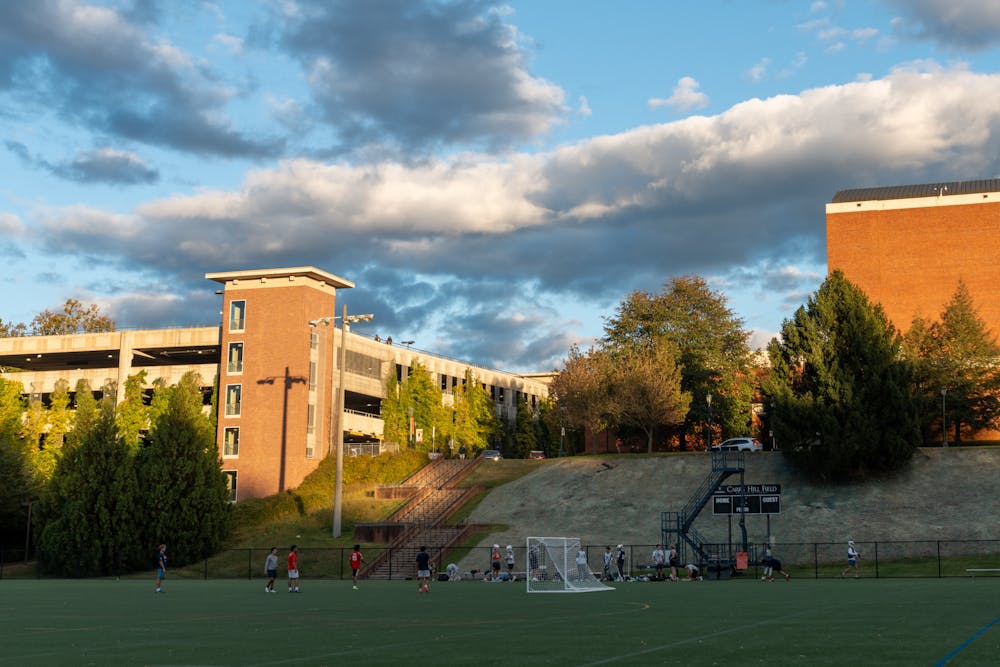The addition of native plants is breathing new life into the hillside by Carr’s Hill Field, the result of a project conducted by the University’s Landscape Services Division and J.W. Townsend Landscapes.
The initiative to replace the existing plant species, which are currently dominated by invasive varieties, began with careful planning and collaboration with J.W. Townsend Landscaping. According to Em Ford, U.Va.'s landscape plant health specialist and co-chair of "Bee Grounds U.Va." — a student-led group that is part of the Office for Sustainability’s Environmental Stewardship Subcommittee — the ground was initially overrun by aggressive invasive species.
Ford said that invasive plants such as porcelain berry, English ivy and non-native bittersweet were present on the hillside.
“As someone myself who is a huge advocate and proponent of utilizing native plants, this is better than it being a hill of invasive [species],” Ford said. “[The native plants] will provide the ecosystem services that they need to provide, and this will create the habitat that we need.”
The new plan will introduce native plants such as yarrow and goldenrod, as well as little bluestem and purple lovegrass, two grasses native to the area. These plants were selected with the aim of creating an ecosystem for local wildlife, offering food and shelter for various species.
Conversely, the invasive plants formerly present in the area were less beneficial to the environment and needed to be maintained with mowers and string trimmers, which was a hazardous task given the meadow’s steep terrain.
“Maintaining a meadow is a lot of work, but it's less equipment and less dangerous,” Ford said. “Since the area’s been cleared, we know what’s there and we know what to keep out.”
Ford said that the area will be supported through hand pulling of smaller invasive plants and targeted spot treatments with selective herbicides for the woody species that cannot realistically be pulled up or physically removed.
Bee Grounds U.Va. has also played a role in bringing the change to the hillside. The group puts on educational events that connect students with groundskeepers and the pollinators that live on Grounds — including through walks to pollinator habitats around Grounds and informational talks about pollination ecology.
Kelsey Schoenemann, co-founder of Bee Grounds and Ph.D. candidate in the Environmental Sciences Department, said that Bee Grounds’ outreach efforts helped lend credibility to the University’s existing push to use pollinator-friendly practices around Grounds.
“Things were already changing at U.Va. before Bee Grounds, but our group's efforts helped to catalyze a real and lasting change,” Schoenemann said.
Over 25 species of plants have been introduced to the hillside in order to see which will thrive in the newly created habitat. Ford said this approach allows for a maintenance plan that focuses on plants that naturally adapt and flourish, with the primary goal to ensure that the chosen plants are native, aesthetically pleasing and beneficial to pollinators and local wildlife.
First-year College student Christa Tuohy sait it was great to know that students can have an impact on the environment of Grounds.
"I just heard about the hillside project, and it's amazing how our University is turning that space into a beautiful meadow full of local plants and wildlife,” Tuohy said.
Plans to change the hillside have been in the works for quite some time. Ford said that the project began in March, when U.Va. landscapers searched for a contractor to help with the project who specialized in meadow conversions. The first application of herbicides was in July.
Bee Grounds will be holding a Bumble Bee ID Workshop Nov. 13th from 12:30-2:00 p.m. at Brown Science Library. Students can sign up through the organization’s Instagram, @beegroundsuva.







